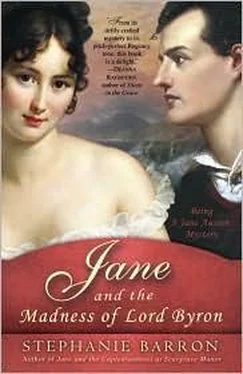General Twining placed his hand in the small of his daughter’s back and thrust her ungently towards the clergyman. “Pray show your gratitude to Mr. Smalls, my dear, for that most eloquent tribute to your brother. Mr. Smalls, for my part, I can conceive of nothing more fitting to the martial nature of Richard’s life — and the bitter waste of his end.”
“Sacrifice,” Mr. Smalls observed, with his small black eyes fixed upon Miss Twining’s cheek, “is the highest purpose of man’s existence on earth. You may be proud, General — if I may so express it — that Richard’s life was wasted; for it is the death won without glory, the obscure and insignificant ending, that is most valued in the eyes of the Creator. We should not set ourselves up as rivals, I am sure, of that consummate sacrifice at Calgary.”
I found this sentiment so revolting I had not a word to utter in response to it. Miss Twining’s fixed regard for the paving-stones at her feet — she had ignored her father’s injunction to effuse her thanks — suggested that the poor child was as little moved. Mr. Smalls’s eloquence may perhaps have been marred by his manner of speaking — he was given to richly rolling consonants, as affected as though he had been trained up in the theatre in his youth, rather than the pulpit; one might suspect him of prating Hamlet when he had no babes to baptise. I wondered if he spoke thusly even in the breakfast parlour, crying out for his bread and butter; or if he was liable to declaim from the nether end of the table, when desperately in want of soup.
“I am sure you have much to say to one another,” I murmured, “and must beg to leave you in peace. General, my condolences on your sad loss; and Mr. Smalls, I shall hope to have the pleasure of listening to your sermon on the morrow.”
His round face flushed darkly; his head inclined. “That is not likely to be possible, Miss Austen. You may not perfectly comprehend my position in life. You will know, I am sure, that there is but one church in Brighton — so charming a town should hardly need more — and that is the venerable St. Nicholas’s, which dates from the fourteenth century, tho’ certain of the tower stones are decidedly Norman in origin. It falls under the authority of the Bishop of Chichester, and his chosen vicar is the most Reverend Mr. Michel, an excellent man. We have argued points of great doctrinal significance from time to time. I myself am attached, however, to Brighton Camp; I am chaplain to the 10th Royal Hussars, whose Colonel-in-Chief is no less a personage than the Regent himself. I owe everything in life to His Royal Highness. Such benevolence! Such condescension!”
“Such unexpected wisdom,” General Twining interposed warmly, “in a Royal of indifferent morals.”
Hendred Smalls positively swelled with pleasure at this speech; his round shoulders thrust back, and the hidden stays that bound his torso creaked ominously. “I should like to offer your party some refreshment, General, before your return to Brighton — a glass of brandy, the hour being already advanced, with perhaps a lemonade for the ladies! — if such an indulgence should not be adjudged improper, on the melancholy occasion. There is something,” he added, with a particularly offensive smile at Catherine Twining, “that I should like to say to Miss Twining.”
I hastened to reply for myself in the negative, and with a final nod to Catherine — whose countenance was compounded of indignation and dread — hurried off down the High Street in the direction of Buckingham House, hopeful of encountering Henry. My pulse had quickened under the influence of recent events; I could not quite contain my wrath, indeed — and had General Twining not grasped his ebony walking-stick so firmly, I might have soundly thrashed him with it.
“IT WAS THE WORST SORT OF HUMILIATION, HENRY, TO see that perfect flower of a girl bound over as chattel to an odious old man, who might easily have been her grandsire!” I fumed, as we mounted the stairs to our bedchambers at the Castle some hours later. We had contented ourselves with a moderate dinner in the publick coffee room, the better to restore ourselves and prepare for the Regent’s reception, to which we were bid at eight o’clock. “Only conceive of the domestic picture! Little Catherine, huge with child at the tender age of sixteen, and her toothless husband laid up with the gout, from a constant overindulgence in Port! It should certainly drive the poor girl mad — or to publick ruin.”
“She’s not quite bound over to this fellow, however,” my brother said thoughtfully. “There was no mention made of a formal engagement. Do not despair, Jane. Miss Twining, recollect, is not without alternatives. Byron may yet prevail!”
“Henry! Do not even joke of such a thing!”
He grinned at me heartlessly. “I should not put it past a girl of Miss Twining’s mettle to escape her father’s plots; she cannot be entirely without friends.”
“She has no mettle at all!” I gasped. “I never knew a more shrinking child. It is clear she has been beaten into conformability from the time she could toddle. But perhaps we may contrive — perhaps the counsel of a friend …”
“Jane, do not involve yourself in the girl’s affairs,” my brother cautioned. “Recollect how her father meets opposition — with the back of his hand. You would not wish to heighten Miss Twining’s misery.”
“No,” I agreed, “but I may yet stand her friend. If our intimacy should progress, I could perhaps invite her to accompany us to Chawton, for a visit of some weeks. She might then escape Lord Byron’s notice — the General’s wrath might cool — and his incomprehensible desire to shackle her to a dotard might dissipate. Excellent Henry! You have put me in mind of the very thing!” I seized his coat excitedly. “For you will not mind a third in the curricle, I am sure, when we quit this place at the end of a fortnight. It should not be so terribly uncomfortable. We are both of us slender ladies, after all — and you are remarkably fit for a widower of advancing years.”
“Such a crush is not to be contemplated,” Henry retorted firmly, “and if you think for a moment that I shall assist you in carrying off that girl, whose father has not the least inclination for our society, you’ve more hair than wit, Jane. I will undertake nothing of the sort. If your heroine is to escape the misery of her unnatural marriage, she shall have to shift for herself. I predict that an ardent young swain will soon appear, desperate to prove his honourable intentions. Allow him to rescue Miss Twining, I beg.”
“Abominable!”
“But unanswerable,” he concluded fondly. “Lie down a little while on your bed; take a glass of the excellent claret I have had sent up to your room; and be ready at my knock to storm the Marine Pavilion. I am sure its magnificence will put the Cheltenham tragedy of Miss Catherine Twining entirely out of your head.”
THE PRINCE REGENT, IT IS SAID, FIRST VISITED THE SMALL village of Brighthelmston around the year ’83, when he was a handsome youth of one-and-twenty. He was urged into Sussex by his doctors, who thought the sea water might ease the ominous swelling of certain organs in the Royal neck; being as yet unacquainted with the vastness of the Prince’s appetites, they apparently mistook the thickening of his person for a more sinister disorder. Whether he dipped his head in the sea or not, remains a question for posterity; but certain it is he dipped his wick — as the Vulgar would say — in every unprotected maiden the surrounding country offered, until the reputation of Brighton, as it came to be known, was too black for any decent lady to contemplate. The Prince sampled every possible pleasure the watering place could offer, from horse racing to card playing to the wines of the King’s Arms — and was led in dissolution by the example of his uncle, the notorious Duke of Cumberland. The Duke held the lease of Grove House, on the Steyne; his nephew enjoyed every freedom of the place, and its raffish circle; and within a few months of his coming of age, hired a modest farmhouse from the principal landowner in these parts — one Thomas Kemp. [9] Thomas Kemp owned most of the land in Brighton at the end of the eighteenth century; his son, Thomas Read Kemp (1782–1844), built Kemp Town in 1823, a significant Regency-style architectural neighborhood between the Royal Crescent and the racecourse on the Downs. The project eventually bankrupted him, and he died on the Continent, unable to meet his creditors’ demands. — Editor’s note.
Читать дальше












